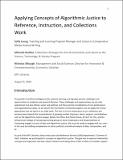| dc.description.abstract | As part of the MIT Libraries Library Instruction and Reference Services (LIRS) department’s “Summer of Data” initiative, we participated in a project on algorithmic justice. The growth of artificial intelligence (AI), machine learning, and big data present challenges and opportunities to academic and research libraries. These challenges and opportunities are not only operational, but also ethical, social, and political, and they prompt consideration of core professional and organizational values. The Libraries must be ready to engage with our users in this area by building competencies in social, political, and ethical analysis of data, computation, and AI. We apply a number of concepts from Meredith Broussard’s Artificial Unintelligence and Ruha Benjamin’s introduction to Captivating Technology to our work at the MIT Libraries. After summarizing some key concepts, we then explore implications for three areas of our work as liaison librarians: reference, instruction, and collection development. Finally, we end with some of the larger implications for the program on information citizenship and the Task Force Report on the Future of Libraries recommendations. | en_US |

